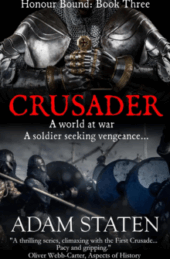Paul Bernardi’s Thurkill’s Rebellion picks up immediately where the second instalment of the Huscarl Chronicles left off. Forced back onto the run thanks to the fallout of the bloody events of Thurkill’s Battle, the protagonist finds himself in a new position of responsibility. Whilst still finding his own feet, he must lead his developing warband and emergent family, providing not just guidance and security but direction and purpose. Decisions must be made. Thurkill’s desire for a peaceful existence for his loved ones seems ever to be intertwined and in conflict with the moral charge of justice for his people. All the while, demons from his past threaten to close in.
The book takes place at a critical time in Britain’s history. It does not radically alter our perception of the era. Bernadi’s eleventh-century is a place of honour and betrayal, stout warriors and cruel politicians, and fighting and drinking in equal measure. Yet, Rebellion gives life to a fascinating period beyond the famous Battle of Hastings which can often serve to overshadow it. Thurkill and the Saxons are increasingly pushed to the margins of their own land in the consolidation of Norman power. For many of those once free and powerful Saxon lords, acceptance of Norman authority was tantamount to servitude. The balance of power shifted, and new alliances needed be made.
In the midst of this tumult, Bernardi paints friendship and loss. The totemic shieldwall of the Saxons brings them both success in warfare and a camaraderie touching on kinship. This central relationship fills the narrative with loveable characters and generous bouts of humour as well as scenes of brutal violence. Indeed, it is in the heat of battle that the book becomes its most vivid with crunching bone and splattering blood, but this only encourages moments of dark humour. And, as ever, love is a powerful motivator of human action.
This third instalment is a thrilling development of both the Saxon story after defeat and the personal story of a character we have got to know so well. Caught up in events beyond his control but also introspective of his own past, Thurkill is discovering what it means to be an adult. Bernardi carefully weaves these stories together and leaves us wondering what will become of these men.






